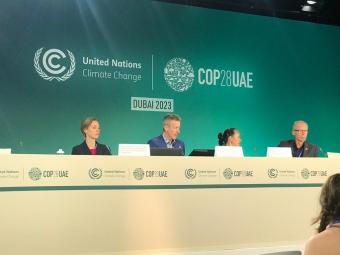- National Oceanography Centre (NOC) scientists have contributed to a brand-new report that warns Earth system tipping points are likely to be triggered due to climate change.
- Scientists say the future of billions of people depend on how fast fossil fuels will be phased out by zero-carbon solutions.
- The report launched today at COP28 was produced by an international research team of more than 200 researchers.
- Emergency global action, accelerated by leaders meeting now at COP28, can harness positive tipping points and steer us towards a thriving, sustainable future.
The world has reached a pivotal moment as threats from Earth system tipping points – and progress towards positive tipping points – accelerate, a new Global Tipping Points Report shows. The report – the most comprehensive assessment of tipping points to date – asserts that the future of billions of people will depend on how fast fossil fuel will be phased out by the growth of zero-carbon solutions.
A tipping point occurs when a small change sparks an often rapid and irreversible transformation, and the effects can be positive or negative. A cascade of positive tipping points would save lives, billions of people from hardship, trillions of dollars in climate-related damage, and begin restoring the natural world upon which we all depend.
The report was produced by an international team of more than 200 researchers from the leading climate institutions, including from Australia, France, Germany, Italy, Kenya, Netherlands, Norway, Spain, Sweden, UK, US, etc., coordinated by the University of Exeter, in partnership with Bezos Earth Fund. NOC scientists Drs Yevgeny Aksenov, Stefanie Rynders and Bablu Sinha led analysis of tipping points in the Atlantic Ocean circulation and of tipping points cascades caused by Arctic sea ice decline.
Based on an assessment of 26 negative Earth system tipping points, the report concludes “business as usual” is no longer possible – with rapid changes to nature and societies already happening, and more coming. With global warming now on course to breach 1.5°C, Earth system tipping points are likely to be triggered – including the collapse of major ice sheets and widespread mortality of warm-water coral reefs.
The report makes six key recommendations to change course fast, including coordinated action to trigger positive tipping points. Emergency global action – accelerated by leaders meeting now at COP28 – can harness positive tipping points and steer us towards a thriving, sustainable future. The report lays out a blueprint for doing this, and says bold, coordinated policies could trigger positive tipping points across multiple sectors including energy, transport, and food.
“Tipping points in the Earth system pose threats of a magnitude never faced by humanity,” said Professor Tim Lenton, of Exeter’s Global Systems Institute. They can trigger devastating domino effects, including the loss of whole ecosystems and capacity to grow staple crops, with societal impacts including mass displacement, political instability and financial collapse. But tipping points also offer our best hope: we need to prioritise and trigger positive tipping points in our societies and economies. This is already happening in areas ranging from renewable energy and electric vehicles to social movements and plant-based diets. Now is the moment to unleash a cascade of positive tipping points to ensure a safe, just and sustainable future for humanity.”
Dr Bablu Sinha from the National Oceanography Centre UK commented:
“There is good evidence that a tipping point exists in the Atlantic Meridional Overturning Circulation (AMOC), in the North Atlantic Subpolar Gyre (SPG) such that the AMOC may collapse in a warmer climate, although we are not sure exactly when this might occur and what warming threshold is required. If it does happen, the consequences would be severe. Potential impacts include changing weather patterns over Europe and in tropical (monsoon) regions, reduced biological productivity in Atlantic bordering regions; reduction in tropical rainforest cover and reduced agricultural output globally.”
Dr Stefanie Rynders, also from the National Oceanography Centre UK, added:
“Arctic sea ice loss leads to increased coastal permafrost erosion. Abrupt changes in summer-autumn sea-ice retreat from the permafrost coast leads to an increase in waves, resulting in an increase in erosion rates in the last 50 years, a two- to fourfold increase in hotspots in the Laptev and Beaufort Seas. Coastal permafrost collapse leads to a potential cascading effect and risk of carbon release locally to the Arctic Ocean and the atmosphere. The erosion causes changes of the shoreline and in carbon, nutrients and contaminant concentrations in the coastal seas and offshore marine environment.”
Dr Yevgeny Aksenov from the National Oceanography Centre UK continued:
“Changes in the ocean and marine ecosystems can occur on timescales from years to a few decades. However, some tipping points can unfold over centuries to millennia, such as permafrost thawing or loss of glaciers. Multiple evidence for fast changes in the cryosphere suggest that we are getting dangerously close to the temperature thresholds of some major tipping points for the ice sheets of Greenland and West Antarctica with unavoidable long-term global sea level rise. While evidence for global-scale tipping dynamics in sea ice and permafrost is limited, their decline will continue with global warming. These, largely irreversible, changes might already have triggered impacts for ecosystems, threatening human society.”
NOC has contributed to three report chapters and companion papers submitted to the ‘Tipping points in the Anthropocene’ special issue of the journal Earth System Dynamics.
The report includes six key recommendations:
- Phase out fossil fuels and land-use emissions now, stopping them well before 2050.
- Strengthen adaptation and “loss and damage” governance, recognising inequality between and within nations.
- Include tipping points in the Global Stocktake (the world’s climate “inventory”) and Nationally Determined Contributions (each country’s efforts to tackle climate change)
- Coordinate policy efforts to trigger positive tipping points.
- Convene an urgent global summit on tipping points.
- Deepen knowledge of tipping points. The research team supports calls for an IPCC Special Report on tipping points.


